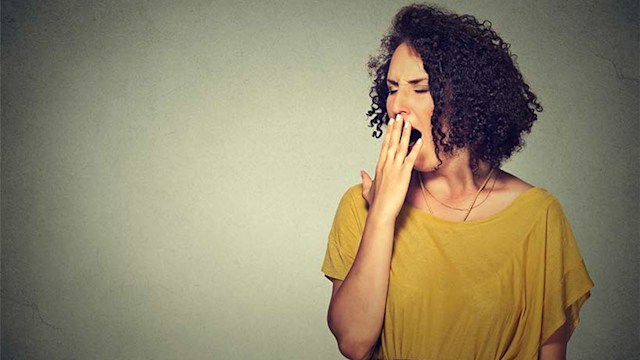Sleep apnoea was found to be one of the contributing factors in Carrie Fisher's death following a heart attack on a flight from London to Los Angeles in December, but what exactly is the condition and how dangerous can it be? We've rounded up all the details on the sleep disorder, which is estimated to affect over 1.5 million people in the UK.
What is sleep apnoea?
Sleep apnoea is where the muscles and soft tissues in the throat relax and collapse sufficiently to cause a total blockage of the airway for ten seconds or more. People with sleep apnoea may experience repeated episodes of this throughout the night, even up to every one or two minutes in severe cases.
Carrie Fisher suffered with sleep apnoea
What are the symptoms of sleep apnoea?
Symptoms are often initially spotted by a person's partner, friend or family member, and may include the following:
- Loud snoring
- Noisy and laboured breathing
- Repeated short periods where breathing is interrupted by gasping or snorting.
According to the NHS, some people with sleep apnoea may also experience night sweats and wake up frequently throughout the night to urinate. The repeated sleep interruptions that occur during apnoea can also leave sufferers feeling very tired during the day.
STORY: Carrie Fisher's daughter releases emotional statement after autopsy is released
What causes sleep apnoea?
In people with sleep apnoea the airway has narrowed as the result of a number of factors, such as:
- Being overweight: Excessive body weight increases the bulk of soft tissue in the neck, which can place a strain on the throat muscles. Excess stomach fat can also lead to breathing difficulties which can make sleep apnoea worse.
- Being male: Sleep apnoea is more common in men than women, which may be related to different patterns of fat distribution.
- Being over the age of 40: The sleep disorder can occur at any age, but is more common in people over the age of 40.
- Having a large neck: Men with a collar size greater than around 17 inches (43cm) have an increased risk of developing sleep apnoea.
- Alcohol, smoking or taking medicines with a sedative effect: These can all increase the risk of developing sleep apnoea.
People with sleep apnoea may need to wear a mask while they sleep
What are the possible complications of sleep apnoea?
If sleep apnoea is left untreated or not properly managed it can lead to a number of complications, and possibly increase your risk of the following:
- Developing high blood pressure
- Having a heart attack or stroke
- Develop an irregular heartbeat
- Develop type 2 diabetes
Research has also shown that people who have been deprived from sleep with sleep apnoea may be up to 12 times more likely to be involved in a car accident.
STORY: Sleep easy - strategies for switching off
How is sleep apnoea diagnosed?
If you suspect you may have sleep apnoea it is important to visit your GP. The sleep disorder is normally diagnosed after you've been observed sleeping at a sleep clinic or by using a testing device worn overnight at home.
When you see your GP they'll usually ask a number of questions about your symptoms, and will likely measure your blood pressure and take a blood sample to help rule out other conditions that may explain your tiredness such as an underactive thyroid gland. The next step is to observe you while you sleep at a local sleep centre to determine whether you have sleep apnoea and what the severity is.
What is the treatment for sleep apnoea?
In many cases of sleep apnoea, you will be advised to make lifestyle changes such as losing weight if you are overweight or obese, stopping smoking, limiting your alcohol consumption and avoiding sedative medications and sleeping tablets.
People with moderate to severe sleep apnoea usually need to wear a continuous positive airway pressure (CPAP) device, which is a small pump that delivers a continuous supply of pumped air through a mask that covers your nose or nose and mouth to prevent your throat closing while you sleep.
See the latest health features here.
